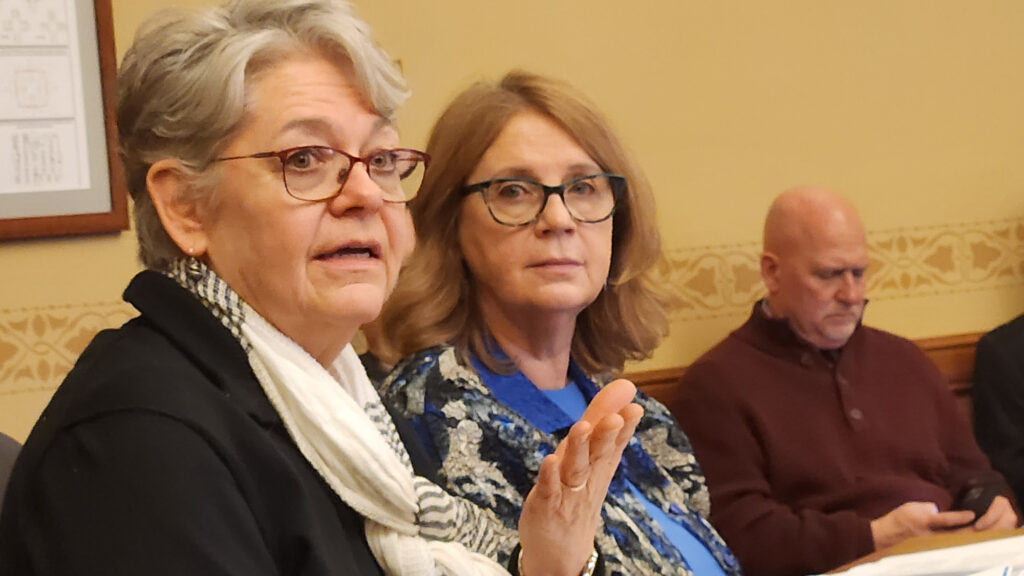Should Child Care Providers Teach 4-Year-Old Kindergarten?
Republicans, child care providers support bill pushing this. DPI opposes it.

Child care administrator Joan Beck testifies Tuesday before the state Senate Education Committee in favor of a bill that would require school districts offering 4-year-old kindergarten to enlist child care providers in the program. With her is another provider, Linda Kudrna. (Wisconsin Examiner photo)
Legislation that would require school districts with 4-year-old kindergarten to collaborate with community child care providers got a mixed response at a Senate hearing Tuesday.
Child care providers testified in favor of the proposal, AB-1035 / SB-973. It’s the only one of 10 child care bills Republicans have offered this session that has won broad support from people who work in the child care field.
Witnesses from the Department of Children and Family Services (DFS) — the state agency that oversees licensed child care providers in Wisconsin — spoke favorably about the proposal’s objective while raising questions about some of its details. DCF’s testimony was for information, not an endorsement or in opposition, said Deputy Secretary Jeff Pertl.
The Department of Public Instruction (DPI), which on its website promotes including child care providers in 4K programs, testified against the legislation. Tom McCarthy, the department aide who testified, said that “from a value perspective DPI does not oppose using the community approach to grow [child care] opportunities across the state,” but that the bill presented problems as written.
The legislation, introduced in January, aims to shore up child care providers by bringing back 4-year-olds, which many providers lost when school districts took on 4K kindergarten programs.
The age group is more economical for providers to care for. Under state regulations, children who are 4 to 5 years old require a ratio of one teacher for up to 13 children. For younger ages, fewer children are allowed per teacher, with the lowest ratio for children age 2 or younger: one teacher for every four children.
In the late 1990s and early 2000s, Wisconsin school districts began expanding their 4K offerings, Pertl testified Tuesday at the Senate Education Committee hearing. An Assembly hearing is scheduled for Wednesday.
Wisconsin allows schools to contract with licensed child care providers to carry out their 4K programming, known as 4K community collaboration or “mixed delivery.” That has diminished considerably as more districts take on the programs themselves.
Pertl said about one out of four Wisconsin school districts that offer 4K are collaborating with child care providers.
Rep. Karen Hurd (R-Fall Creek) told the committee that in conversations she and her Republican colleagues had with providers over the last several months, the loss of 4K children “is one thing that came up over and over — what cut the legs out from under the child care industry.”
Providers “were left with the more expensive, younger, staff-intensive mix of children to serve,” said Priya Bhatia, DCF early care and education division administrator. “This bill would provide more stability and continuity of care for children and families.“
The legislation would require school districts offering 4K kindergarten to contract with local child care providers to provide those classes if they wanted to in addition to the 4K classes that the school district operates.
Enlisting more child care centers as 4K providers for public schools would also make it easier on parents who need “wraparound care” — child care before and after the kindergarten classes, Bhatia said.
If families must travel between a school’s part-day 4K program and a child care provider, “this causes disruption for children and can be a transportation burden for families,” Bhatia said. “The 4K community approach reduces these disruptions by providing a more seamless educational program and wraparound experience in a single location offered by a provider that parents already know and trust.”
Bhatia said there were three primary concerns that would make 4K community collaboration more successful if they were addressed in the bill:
- Counting children in 4K as the equivalent of a full-time student under the state’s school financing system. Currently 4K students count as one-half of a full-time student when state aid is calculated.
- Working out a payment formula for school districts that contract with child care providers that both parties to the contract can accept.
The bill would require districts to pay at least 95% of the local per-pupil funding for 4K students to the providers enrolling those students, with the district retaining up to 5% for administrative costs. Bhatia suggested it would be more appropriate for the child care provider and the district to work out “the appropriate balance” between each party.
- Ensuring uniform licensing standards focused on the 4K teachers. Child care providers have questioned DPI’s licensing standards that cover children from birth to third grade as “more geared toward early and elementary education rather than 4K,” Bhatia said.
The legislation would require child care workers who teach in a 4K program to have a bachelor’s degree or an associate degree and to be enrolled in a bachelor’s degree program with a four-year timeline.
The differences in licensing standards between teachers employed in school district 4K programs and those working with that age group in child care centers is one problem that skeptics of the legislation have pointed to.
Sen. Chris Larson (D-Milwaukee) questioned what he called “eliminating the professional standards for teachers in the bill.” The bill’s Assembly author, Rep. Joy Goeben (R-Hobart), reiterated the bill’s educational requirements for child care workers and stressed that they would be overseen by DCF.
“These people are already taking care of these children,” added Sen. Romaine Quinn (R-Cameron), the Senate author.
“But there’s a difference between child care and school,” Larson replied, calling teachers professionals who have attained a degree.
“Early child care providers are professionals who go through and get a degree in educating children in early childhood,” responded Goeben, a former child care provider, adding that “it’s a little demeaning to say they would be less able to educate in their field and their expertise.”
McCarthy, the DPI aide, said one concern that the department had was that requiring districts to contract with child care providers to provide 4K lessons could conflict with the heightened attention to early literacy and reading under legislation enacted in 2023. That law includes uniform curriculum standards, while child care centers participating would have greater freedom in curriculum selection under the bill.
McCarthy also questioned how contracted child care providers would respond to children with disabilities or other special needs.
Corrine Hendrickson, a child care provider and organizer of an advocacy and support network for providers and parents, said child care providers involved in community collaboration have a good track record of helping children with special needs get services.
“Children with special needs are more likely to be identified and receive supports in communities that collaborate, as the child care program knows who to talk to at the school,” Hendrickson testified.
Hendrickson said that the legislation also supports federal funding changes that are going to favor mixed delivery. Other states are already further along in focusing on the community collaboration approach “to promote every child having access to high quality preschool without impeding access to working parents [for] the care and education of all children between the ages of six weeks and 12 years,” she said.
Joan Beck, a child care administrator in Dodge County, said that her center was a 4K provider in the past and considers parents “our partners” while supporting them in the early education and development of their children.
“We take education seriously,” Beck said. “Our education starts at birth.” DCF, she added, provided extensive oversight that contributed to the program’s quality.
“Rather than looking at it as, we’re taking [children] out of the public schools, why can’t it be we’re partnering with the public schools?” Beck said. “Look at us as reasonable people who can do the job.”
Child care providers say they’re equipped to help teach 4-year-old kindergarten was originally published by Wisconsin Examiner.





















